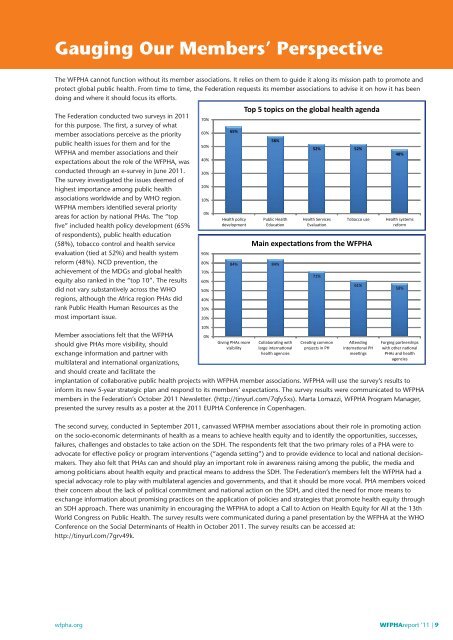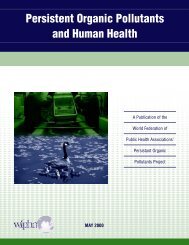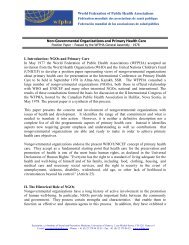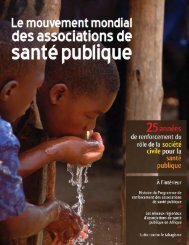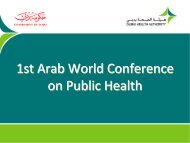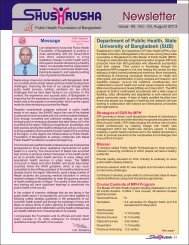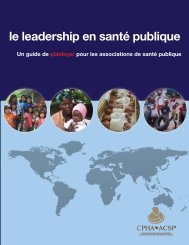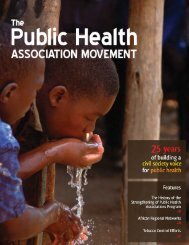WFPHA Annual Report - Delaware Health Sciences Alliance
WFPHA Annual Report - Delaware Health Sciences Alliance
WFPHA Annual Report - Delaware Health Sciences Alliance
Create successful ePaper yourself
Turn your PDF publications into a flip-book with our unique Google optimized e-Paper software.
Gauging Our Members’ PerspectiveThe <strong>WFPHA</strong> cannot function without its member associations. It relies on them to guide it along its mission path to promote andprotect global public health. From time to time, the Federation requests its member associations to advise it on how it has beendoing and where it should focus its efforts.The Federation conducted two surveys in 2011for this purpose. The first, a survey of whatmember associations perceive as the prioritypublic health issues for them and for the<strong>WFPHA</strong> and member associations and theirexpectations about the role of the <strong>WFPHA</strong>, wasconducted through an e-survey in June 2011.The survey investigated the issues deemed ofhighest importance among public healthassociations worldwide and by WHO region.<strong>WFPHA</strong> members identified several priorityareas for action by national PHAs. The “topfive” included health policy development (65%of respondents), public health education(58%), tobacco control and health serviceevaluation (tied at 52%) and health systemreform (48%). NCD prevention, theachievement of the MDGs and global healthequity also ranked in the “top 10”. The resultsdid not vary substantively across the WHOregions, although the Africa region PHAs didrank Public <strong>Health</strong> Human Resources as themost important issue.Member associations felt that the <strong>WFPHA</strong>should give PHAs more visibility, shouldexchange information and partner withmultilateral and international organizations,and should create and facilitate the70%60%50%40%30%20%10%0%90%80%70%60%50%40%30%20%10%0%65%<strong>Health</strong> policydevelopmentTop 5 topics on the global health agendaimplantation of collaborative public health projects with <strong>WFPHA</strong> member associations. <strong>WFPHA</strong> will use the survey’s results toinform its new 5-year strategic plan and respond to its members’ expectations. The survey results were communicated to <strong>WFPHA</strong>members in the Federation’s October 2011 Newsletter. (http://tinyurl.com/7qfy5xs). Marta Lomazzi, <strong>WFPHA</strong> Program Manager,presented the survey results as a poster at the 2011 EUPHA Conference in Copenhagen.58%Public <strong>Health</strong>Educaon84% 84%Giving PHAs morevisibility52% 52%<strong>Health</strong> ServicesEvaluaon71%Tobacco useMain expectaons from the <strong>WFPHA</strong>Collaborang withlarge internaonalhealth agenciesCreang commonprojects in PH61%Aendinginternaonal PHmeengs48%<strong>Health</strong> systemsreform58%Forging partnershipswith other naonalPHAs and healthagenciesThe second survey, conducted in September 2011, canvassed <strong>WFPHA</strong> member associations about their role in promoting actionon the socio-economic determinants of health as a means to achieve health equity and to identify the opportunities, successes,failures, challenges and obstacles to take action on the SDH. The respondents felt that the two primary roles of a PHA were toadvocate for effective policy or program interventions (“agenda setting”) and to provide evidence to local and national decisionmakers.They also felt that PHAs can and should play an important role in awareness raising among the public, the media andamong politicians about health equity and practical means to address the SDH. The Federation’s members felt the <strong>WFPHA</strong> had aspecial advocacy role to play with multilateral agencies and governments, and that it should be more vocal. PHA members voicedtheir concern about the lack of political commitment and national action on the SDH, and cited the need for more means toexchange information about promising practices on the application of policies and strategies that promote health equity throughan SDH approach. There was unanimity in encouraging the <strong>WFPHA</strong> to adopt a Call to Action on <strong>Health</strong> Equity for All at the 13thWorld Congress on Public <strong>Health</strong>. The survey results were communicated during a panel presentation by the <strong>WFPHA</strong> at the WHOConference on the Social Determinants of <strong>Health</strong> in October 2011. The survey results can be accessed at:http://tinyurl.com/7grv49k.wfpha.org <strong>WFPHA</strong>report ’11 | 9


